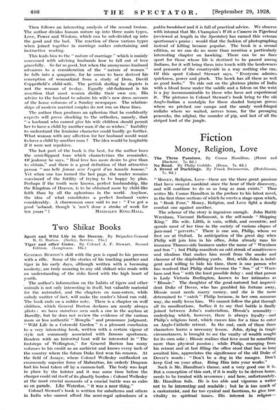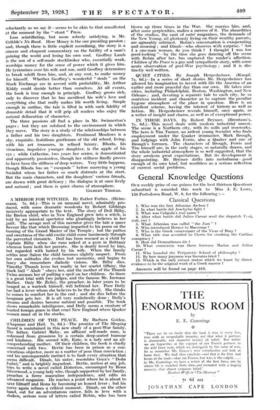Fiction
Money, Religion, Love
No Road. By Philip Gribble. (Bonn. 7s. &L) " MONEY, Religion, Love—these are the three great passions that have swayed mankind since the hour of their discovery, and will continue to do so as long as man exists." Thus writes Mr. Cosmo Hamilton in the preface to his latest novel, in the first three sections of which he erects a stage upon which, in " Book Four," Money, Religion, and Love fight a deadly combat one against another.
The scheme of the story is ingenious enough. John Battle Wrexham, Viscount Bellamont, is the self-made " Shipping King." His wife, Lilith, is vain, selfish, and eccentric, and spends most of her time in the society of various cliques of jazz-mad " perverts." There is one son, Philip, whom we first see at Oxford. In anticipation of the great day when Philip will join him in his office, John already runs his
immense Thames-side business under the name of " Wrexham and Son " ; but Philip manifests an odd streak of sensitiveness and idealism that makes him recoil from the smoke and clamour of the shipbuilding yards. But, while_John is indul- gent and willing to bide his time, there is one person who has resolved that Philip shall become the " Son " of " Wrex- ham and Son " with the least possible delay : and that person is Lady Victoria Burlington, known to her intimates as " Blossie." The daughter of the good-natured but improvi- dent Duke of Dover,, who has gambled his fortune away, Blossie must needs marry money, and she is the more
determined to " catch " Philip because, in her own sensuous way, she really loves him. We cannot follow the plot through
all its ramifications. Suffice it to say that battle is finally joined between John's materialism, Blossie's sensuality— underlying which, however, there is always loyalty—and Philip's religious bent, which causes him for a time to enter an Anglo-Catholic retreat. In the end, each of these three characters learns a necessary lesson. John, dying in tragic circumstances, is brought to see the vanity of wealth sought for its own sake.; Blossie realizes that-love must be something more than physical passion ; while Philip, emerging from his retreat and at last filling the office stool that has so long awaited him, appreciates the significance of the old Duke of Dover's words : " Don't be a dog in the manger. Don't keep God on your altar. Bring Him into your works."
Such is Mr. Hamilton's theme, and a very good one it is. But a conception of this sort, if it is really to be driven home, needs to be treated with reverence ; add here, unfortunately, Mr. Hamilton fails. lIe is too able and vigorous a writer not to be interesting and readable ; but he is too much of a caricaturist, and far too cynical and facetious, to give true vitality to spiritual issues. His interest in religion-
reluctantly as we say it—seems to be akin to that manifested at the moment by the " stunt " Press.
Less scintillating, but more soberly satisfying, is Mr. Gribble's No Road. Here Money is the one presiding passion ; and, though there is little explicit moralizing, the story is a sincere and eloquent commentary on the futility of a man's gaining the world and losing his own soul. Geoffrey Lamb is the son of a self-made stockbroker who, essentially weak, worships money for the sense of power which it gives him. He tyrannizes over his wife and son, until Geoffrey determines to break adrift from him, and, at any cost, to make money for himself. Whether Geoffrey's wonderful " deals " on the Stock Exchange are in accord with probability, Mr. Arthur Kiddy could decide better than ourselves. At all events, the book is true enough in principle. Geoffrey grows rich, only to discover that he has sacrificed his wife's love and everything else that really makes life worth living. Simple enough in outline, the tale is filled in with such fidelity of domestic detail that it will grip all readers who enjoy the natural delineation of character.
The three passions all find a place in Mr. Swinnerton's pages ; but they are subdued to the environment in which they move. The story is a study of the relationships between a father and his two daughters. Ferdinand Meadows is a shy, exquisite, fastidious gentleman of the old school, living, with his art treasures, in refined luxury. Rhoda, his vivacious, impulsive younger daughter, is the apple of his eye ; while Catherine, two years her senior, is domesticated and apparently passionless, though her stillness finally proves to have been the stillness of deep waters. Very little happens, though Rhoda has an " escapade " before marrying a young Socialist whom her father so much distrusts at the start. But the main characters, and the daughters' various friends, are drawn with great delicacy ; the dialogue is at once lively and natural ; and there is quiet charm of atmosphere.
GILBERT THOMAS.





































 Previous page
Previous page